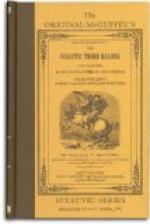Notes.—“Rugby,” the scene of this story, is a celebrated grammar school which was established at the town of Rugby, England, in 1567.
9. Sixth-form boy. The school was graded into six classes or “forms,” and the boys of the highest, or sixth, form were expected to keep the smaller boys under them in order. Exercises.—What were Arthur’s feelings the first night at Rugby? Relate what happened when he said his prayers. What do you think of the boy who threw the slipper? Was Tom right in defending Arthur from insult?
LXVIII. DARE TO DO RIGHT. (Concluded.) (186)
1. It was no light act of courage in those days for a little fellow to say his prayers publicly, even at Rugby. A few years later, when Arnold’s manly piety had begun to leaven the school, the tables turned: before he died, in the Schoolhouse at least, and I believe in the other houses, the rule was the other way.
2. But poor Tom had come to school in other times. The first few nights after he came he did not kneel down because of the noise, but sat up in bed till the candle was out, and then stole out and said his prayers, in fear lest some one should find him out. So did many another poor little fellow.
3. Then he began to think that he might just as well say his prayers in bed, and then that it did not matter whether he was kneeling, or sitting, or lying down. And so it had come to pass with Tom, as with all who will not confess their Lord before men; and for the last year he had probably not said his prayers in earnest a dozen times.
4. Poor Tom! the first and bitterest feeling, which was like to break his heart, was the sense of his own cowardice. The vice of all others which he loathed was brought in and burned in on his own soul. He had lied to his mother, to his conscience, to his God. How could he bear it? And then the poor, little, weak boy, whom he had pitied and almost scorned for his weakness, had done that which he, braggart as he was, dared not do.
5. The first dawn of comfort came to him in vowing to himself that he would stand by that boy through thick and thin, and cheer him, and help him, and bear his burdens, for the good deed done that night. Then he resolved to write home next day and tell his mother all, and what a coward her son had been. And then peace came to him as he resolved, lastly, to bear his testimony next morning.
6. The morning would be harder than the night to begin with, but he felt that he could not afford to let one chance slip. Several times he faltered, for the Devil showed him, first, all his old friends calling him “Saint,” and “Squaretoes” and a dozen hard names, and whispered to him that his motives would be misunderstood, and he would be left alone with the new boy; whereas, it was his duty to keep all means of influence, that he might do good to the largest number.




